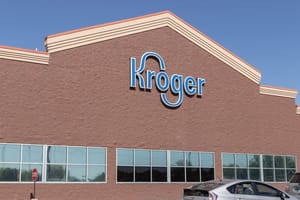For Walmart, No Ifs, Ands or Bots
Why Walmart is decommissioning a robot fleet. Basket Economics: The surprise decommissioning of inventory robots at Walmart isn’t a blow to automation—just a different route to efficiency.


“You’ve got to listen to me! Elementary chaos theory tells us that all robots will eventually turn against their masters and run amok in an orgy of blood and kicking and the biting with the metal teeth and the hurting and shoving!”
If you reside in the subset of fans of "The Simpsons" who also happen to be retail watchers you might have been reminded of Professor Frink’s above quote upon the revelation—first reported in The Wall Street Journal last week—that the giant retailer Walmart was abruptly giving up on a plan to track inventory and shelf-tag accuracy by use of robots roaming the aisles of its stores.
And while there were no reports of an associated uprising, it was a surprising story to confront given all the attention that automation has been generating in retail lately—a lot of it passed along by people like me—that might be interpreted to mean that robots are a kind of inevitability in retail workplaces, and that once they arrive, there is no going back.
What this story reminds us, however, is that technological innovation in service of greater cost efficiency is what’s here to stay, but the specific means of achieving that are on pretty much their own to deliver. Indeed, that’s Walmart’s not-so-secret mission from the start—"Save Money to Live Better," doncha know—and when it discovered that this particular invention wasn’t aiding that mission, for whatever reason, it only made sense to cancel its contract with the vendor, the Bay Area startup Bossa Nova Robotics. Walmart reportedly was about halfway toward a plan announced early this year to expand the fleet to 1,000 of its stores, but in today’s test-fast-and-fail-fast world—another aspect of the tech field that’s become part of retail—moving on with haste is part of the bargain.
There was little concrete about the specific issues the sides may have encountered. Unverified online chatter from employees suggest that some stores may have wound up with inaccurate data, while others say sloppy conditions at stores to begin with—no doubt exacerbated by COVID disruption to the supply chain—could have led to such data troubles. The Journal cited sources saying that Walmart was discovering that with employees turned into busy shopping concierges to support a booming e-commerce business run largely from stores, they themselves are doing the job of inventory monitoring efficiently. Tom Ward, Walmart’s SVP of consumer product, has referred to proprietary innovation in worker handheld devices as also aiding the retailer’s inventory understanding.
Finally, there was speculation that shoppers in stores might not be comfortable sharing aisles with six-foot robots emitting a spooky bright light onto shelves.
I personally don’t buy that last explanation any more than I’d believe a rouge Bossa Nova took a bite out of Doug McMillon’s leg. And it doesn’t appear Walmart does either, as it proceeds full-speed ahead with time- and money-saving inventions like robotic floor sweepers and back-room sorters, unpiloted deliveries by car and drone, new workplace deployments or any of the other dozens of ideas the tech revolution promises can save money so shoppers can live better.
That said, Walmart not long ago had big ambitions for Bossa Nova—particularly as a means to connect the data they collected with the work employees could do to address the issues they revealed, proudly showing off the machines and associated workflow apps at press events. But it’s not as though those lessons went for naught. As a spokesperson told the Journal: “We learned a lot about how technology can assist associates, make jobs easier and provide a better customer experience. We will continue testing new technologies and investing in our own processes and apps to best understand and track our inventory and help move products to our shelves as quickly as we can.”
At Bossa Nova, there have been layoffs and C-suite departures in recent months. The company hasn’t publicly commented on Walmart but its co-founder told TechCrunch that the pandemic “has forced us to streamline our operations and focus on our core technologies.”
“We have made stunning advances in AI and robotics. Our retail AI is the industry’s best and works as well on robots as with fixed cameras, and our hardware, autonomy and operations excelled in more than 500 of the world’s most challenging stores,” Sarjoun Skaff continued. “With the board’s full support, we continue deploying this technology with our partners in retail and in other fields.”
Other vendors in the tech space—focused on what they say is a $1 trillion opportunity to better address losses associated with stockouts, location errors and pricing errors—insist that opportunity remains despite their rival’s apparent setback.
“We’re not surprised by the Walmart news. Automated solutions must be accurate, actionable and frequent, or vendors end up losing retailers’ and associates’ trust. When that data isn’t delivering, it only creates additional work for the associates. We also believe that you need the right robot—if the robot’s presence is intimidating to shoppers, that is a problem,” Mark Cook, EVP of Retail Solutions for Trax, a software platform solution using computer vision gathered at shelf- and ceiling-mounted cameras, said in emailed comments to WGB.
“We don’t believe relying solely on human data collection is the right approach, either,” he added. “Retailers have been trying to solve the massive out-of-stock problem with humans for ages, but without success and at a great cost. … To win in this new retail environment, retailers must deliver on the essentials of product availability, while maintaining a positive shopper experience. That’s where humans perform best—when focusing on helping shoppers, rather than manual gap and price scanning, which can be solved through automation.”
Brad Bologea, co-founder and CEO of Bossa Nova rival Simbe Robotics, which is rolling out its own six-foot inventory trackers at retailers such as Schnuck Markets, largely agrees.
“Bossa Nova’s failure is not an indication of a lack of opportunity or necessity for retail robotics in the market,” Bologea said, adding that info on shelf availability, pricing and location robotics can find and process “simply cannot be efficiently solved by human workers … it’s not feasible from an operations standpoint.”
“Any technology decision for the retail industry is also about commitment and finding the best solution for the business case. Retailers are rightfully, carefully considering the right time to invest and the longevity and viability of specific robotics solutions. This is why the robotics industry is shifting to technology-as-a-service, allowing retailers to hold their vendors to strict [service level agreements], avoid engaging in multiyear investments and remain laser focused on ROI and real business impact,” he continued.
“The future of retail robotics is exciting, and it’s just getting started.”
Read more about:
WalmartAbout the Author
You May Also Like






